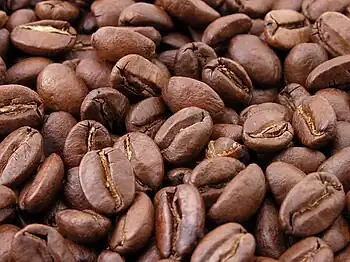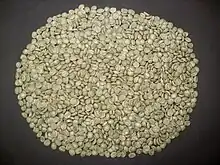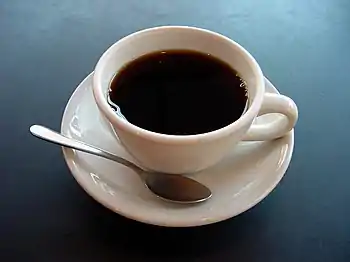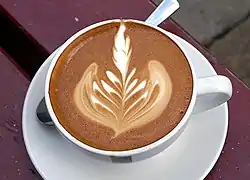Coffee (color)
Coffee is a brownish color that is a representation of the color of a roasted coffee bean. Different types of coffee beans have different colors when roasted—the color coffee represents an average.
| Coffee | |
|---|---|
| Hex triplet | #6F4E37 |
| sRGBB (r, g, b) | (111, 78, 55) |
| HSV (h, s, v) | (25°, 50%, 44%) |
| CIELChuv (L, C, h) | (36, 30, 39°) |
| Source | ISCC-NBS |
| ISCC–NBS descriptor | Moderate brown |
| B: Normalized to [0–255] (byte) | |
The first recorded use of coffee as a color name in English was in 1695.[1]
The normalized color coordinates for coffee are identical to Tuscan brown, which was first recorded as a color name in English in 1913.[2]


Variations of coffee
Café au Lait
| Café au Lait | |
|---|---|
| Hex triplet | #A67B5B |
| sRGBB (r, g, b) | (166, 123, 91) |
| HSV (h, s, v) | (26°, 45%, 65%) |
| CIELChuv (L, C, h) | (55, 41, 41°) |
| Source | ISCC-NBS |
| ISCC–NBS descriptor | Light brown |
| B: Normalized to [0–255] (byte) | |
The color displayed at right is café au lait, also known as coffee and milk or latte. This is a representation of the color of coffee mixed with milk, which when prepared commercially by a barista in a coffee shop is known as a latte.
The first recorded use of cafe au lait as a color name in English was in 1839.[3]
The normalized color coordinates for café au lait are identical to Tuscan tan and French beige, which were first recorded as color names in English in 1926[4] and 1927,[5] respectively.
Café Noir
| Café Noir | |
|---|---|
| Hex triplet | #4B3621 |
| sRGBB (r, g, b) | (75, 54, 33) |
| HSV (h, s, v) | (30°, 56%, 29%) |
| CIELChuv (L, C, h) | (24, 20, 46°) |
| Source | ISCC-NBS |
| ISCC–NBS descriptor | Dark yellowish brown |
| B: Normalized to [0–255] (byte) | |

The color displayed at right is café noir, also known as black coffee. It is a representation of the color of brewed black coffee.
The first recorded use of cafe noir as a color name in English was in 1928.[6]
See also
References
- Maerz and Paul A Dictionary of Color New York:1930 McGraw-Hill p. 193; Color Sample of Coffee: p. 53—Plate 15 Color Sample A11
- Maerz and Paul A Dictionary of Color New York:1930 McGraw-Hill p. 206; Color Sample of Tuscany: p. 37 Plate 7 Color Sample H12
- Maerz and Paul A Dictionary of Color New York:1930 McGraw-Hill p. 191; Color Sample of Cafe au Lait: p. 47 Plate 12 Color Sample A6
- Maerz and Paul A Dictionary of Color New York:1930 McGraw-Hill p. 206; Color Sample of Tuscan tan: p. 49 Plate 13 Color Sample C8
- Maerz and Paul A Dictionary of Color New York:1930 McGraw-Hill p. 195; Color Sample of French beige: p. 49 Plate 13 Color Sample A7
- Maerz and Paul A Dictionary of Color New York:1930 McGraw-Hill p. 191; Color Sample of Cafe Noir: p. 39—Plate 8 Color Sample H12
